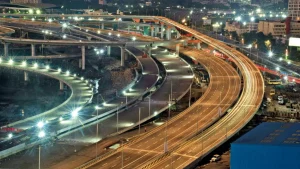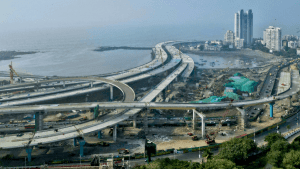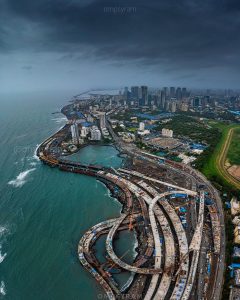In a move that has sparked widespread debate among Mumbai residents and urban planning experts, the Brihanmumbai Municipal Corporation (BMC) has announced plans for the Mumbai Coastal Road BMC demolish flyover project. This controversial decision involves tearing down the Veer Savarkar flyover in Goregaon, a structure that was built for Rs 27 crore and inaugurated just seven years ago in 2018. The demolition is being undertaken to facilitate the elevated connector for the Versova-Dahisar stretch of Coastal Road Phase 2, raising serious questions about urban planning efficiency and taxpayer money utilisation.
The Veer Savarkar flyover was constructed with significant public investment and was inaugurated in 2018 as part of Mumbai’s infrastructure development initiatives. The structure was designed to ease traffic congestion in the Goregaon area and improve connectivity for residents. However, the Mumbai Coastal Road BMC’s demolition of the flyover has rendered this seven-year-old infrastructure investment obsolete, highlighting potential flaws in long-term urban planning coordination.
 When completed, the flyover served as a crucial link for commuters travelling through Goregaon, providing relief from ground-level traffic congestion. The structure was built using modern engineering techniques and was expected to serve the community for several decades. The current Mumbai Coastal Road BMC demolish flyover plan has effectively nullified these benefits, creating frustration among residents who had adapted their daily commutes around this infrastructure.
When completed, the flyover served as a crucial link for commuters travelling through Goregaon, providing relief from ground-level traffic congestion. The structure was built using modern engineering techniques and was expected to serve the community for several decades. The current Mumbai Coastal Road BMC demolish flyover plan has effectively nullified these benefits, creating frustration among residents who had adapted their daily commutes around this infrastructure.
The Mumbai Coastal Road project represents one of India’s most ambitious infrastructure developments, with Phase 1 connecting Princess Street to the Bandra-Worli Sea Link. Phase 2 extends this connectivity further north, covering approximately 19 kilometres from Bandra to Kandivali. The Mumbai Coastal Road BMC demolish flyover decision is directly linked to accommodating the elevated connector for the Versova-Dahisar stretch within this broader development framework.
Also read: Mumbai Coastal Road Project (MCRP)
For other Information on other BMC projects: BMC halts all excavations
The Coastal Road Phase 2 requires specific elevation and alignment parameters that conflict with the existing Veer Savarkar flyover’s structure. Engineering assessments have determined that retrofitting or modifying the existing flyover would be more expensive and technically challenging than complete demolition. This technical necessity drives the Mumbai Coastal Road BMC to demolish the flyover, despite the obvious financial implications.


While the demolition represents an immediate loss, BMC officials argue that the long-term benefits of the Coastal Road Phase 2 justify this expense. The new infrastructure promises to reduce travel times significantly, potentially cutting journey durations from 35-45 minutes to under 10 minutes during peak hours. However, critics argue that better planning could have avoided the Mumbai Coastal Road BMC demolish flyover scenario.
The Mumbai Coastal Road BMC demolition of the flyover process will inevitably cause significant traffic disruptions in Goregaon. Residents and businesses must prepare for extended periods of construction-related inconvenience, including alternative route planning and potential impacts on daily commercial activities. The BMC has yet to announce comprehensive traffic management plans for the demolition period.
Residents have expressed mixed reactions to the Mumbai Coastal Road BMC’s demolish the flyover. While some appreciate the eventual benefits of improved coastal connectivity, others question the wisdom of demolishing relatively new infrastructure. Community leaders are demanding transparent communication about project timelines and compensation mechanisms for affected businesses.
The Mumbai Coastal Road BMC demolishes the flyover situation, highlighting critical coordination challenges within Mumbai’s urban planning ecosystem. Different departments and project timelines appear to have operated in isolation, resulting in conflicting infrastructure requirements. This case study demonstrates the urgent need for integrated planning approaches in major metropolitan areas.
Urban planning experts are using the Mumbai Coastal Road BMC demolish flyover case as an example of how cities must improve their long-term infrastructure coordination. The incident underscores the importance of comprehensive master planning that considers all future development scenarios before committing significant public resources to individual projects.
The demolition process will generate substantial construction waste that must be managed responsibly. Environmental activists are monitoring the Mumbai Coastal Road BMC demolish flyover project to ensure proper waste disposal and recycling practices. The environmental cost of demolishing relatively new infrastructure adds another layer of concern to this controversial decision.
From a sustainability perspective, the Mumbai Coastal Road BMC demolish the flyover challenges the principles of resource efficiency and long-term planning. The carbon footprint of constructing infrastructure only to demolish it within seven years contradicts modern sustainable development practices and raises questions about municipal environmental responsibility.


As Mumbai continues its rapid urban expansion, the lessons learned from this demolition decision will hopefully inform more integrated and forward-thinking infrastructure planning processes, ultimately benefiting the city’s millions of residents and preventing future instances of premature infrastructure obsolescence.

